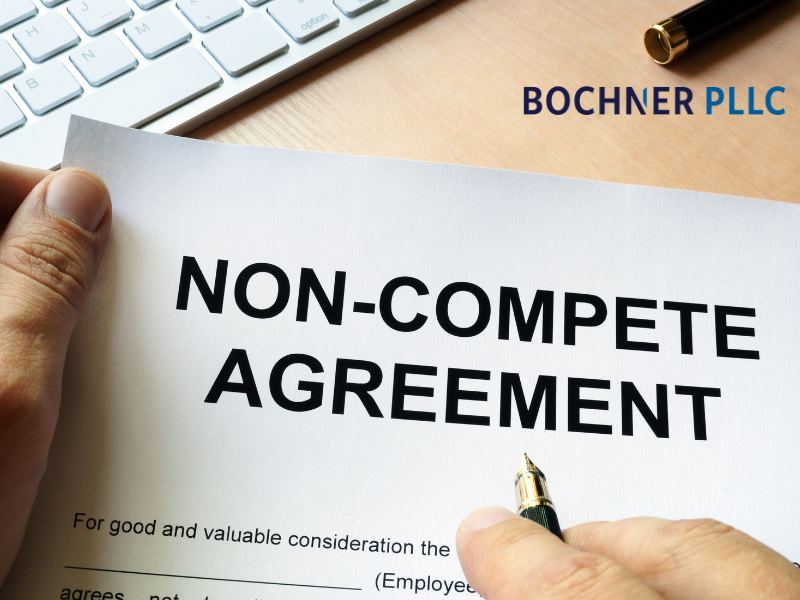
In a landmark move, the Federal Trade Commission (FTC) has ushered in significant changes by approving a Final Rule that restricts the use of non-compete agreements between employers and workers. Bochner PLLC, your trusted legal partner, is here to provide clarity on the implications of this ruling and offer guidance on compliant alternatives for employers. In a recent legal alert by Bochner PLLC attorney Jeff Douglas, we outlined some of the following key points that you should be aware of as an employer.
Summary of the Final Rule
The Final Rule, passed by a 3-2 vote on April 23, 2024, marks a pivotal moment in employment law. It prohibits the use of nearly all non-compete agreements and introduces key provisions affecting both existing and future employment arrangements:
- Prohibits new non-compete clauses between employers and workers.
- Nullifies existing non-compete agreements for non-senior executives.
- Mandates employers to notify workers with non-competes that they are no longer enforceable.
- Allows for specific non-compete provisions related to business sales.
- Impacts post-employment restrictive covenants but excludes restraints on concurrent employment.
Understanding the Prohibitions
The scope of the Final Rule is extensive, encompassing not only traditional employees but also a broader category of “workers,” including independent contractors, interns, and volunteers. However, a distinction is made between senior executives and other workers regarding the enforceability of existing non-competes.
For non-senior executives, existing non-compete agreements will no longer hold weight. Employers must notify affected individuals accordingly. Conversely, non-competes for senior executives meeting specific salary and policy-making criteria may continue to be enforced.
While non-compete provisions are broadly prohibited, the Final Rule allows for other forms of restrictive covenants, such as confidentiality agreements and non-solicitation clauses. Employers can also explore alternatives like garden leave policies or fixed-term employment agreements.
Navigating Legal Challenges
The FTC’s Final Rule has sparked legal challenges, with organizations contesting its enforceability and constitutionality. While judicial intervention could potentially delay its implementation, employers must also navigate existing state-level regulations on non-competes, with states like California already imposing stringent limitations.
Additionally, the National Labor Relations Board (NLRB) views non-competes as unfair labor practices, a stance reinforced by the FTC’s ruling. Employers must remain vigilant amid evolving legal landscapes and potential synergies between federal and state regulations.
Action Items for Employers
In anticipation of the Final Rule’s implementation, employers are urged to review and revise their policies and agreements. Key areas for evaluation include:
- Employment agreements, including severance and release agreements.
- Employee handbooks and internal policies.
- Confidentiality and proprietary information agreements.
- Non-solicitation provisions concerning clients and employees.
- Independent contractor agreements.
- Severance policies, including the adoption of garden leave provisions.
- Enforcement and Compliance
- Any employers with non-compete violations against previous employees should file suit as soon as possible. Active lawsuits will not be exempt per the current version of the rule.
- While the FTC lacks authority to impose monetary penalties, it can initiate administrative proceedings or seek injunctions against non-compliant employers. Compliance with the Final Rule is essential to avoid potential legal repercussions and safeguard business interests.
How Bochner PLLC Can Help
As your legal partner, Bochner PLLC stands ready to assist with navigating the complexities of the FTC’s Final Rule. Our experienced employment and corporate attorneys are equipped to address your questions and provide tailored solutions to ensure compliance and protect your organization’s interests.
For further assistance or inquiries, please contact Jeffrey Douglas, Brent Britton, or Chloë D. Brownstein.
At Bochner PLLC, we’re committed to helping you navigate regulatory changes and empower your business for success in an evolving legal landscape.







